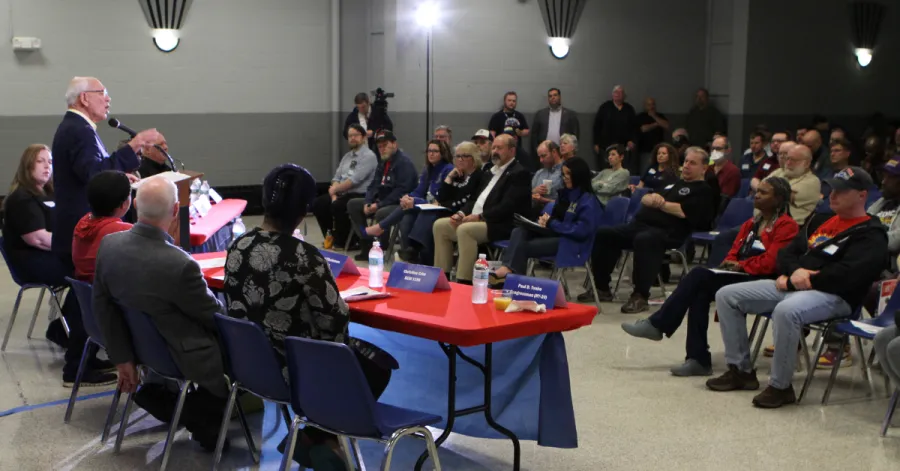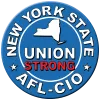Healthcare Workers Raise Alarm Over Federal Cuts at Forum with Congressman Paul Tonko

Albany, NY - Healthcare workers from across the Capital Region — including nurses, medical researchers, and employees caring for the most vulnerable — gathered today to share their personal stories and voice growing concerns over the Trump administration’s healthcare policies and proposed funding cuts.
In a passionate and urgent forum hosted by the New York State AFL-CIO and the Capital District Area Labor Federation, union members detailed how federal cuts are already straining critical healthcare services, threatening jobs, and jeopardizing patient care in communities throughout the region and beyond.
Congressman Paul Tonko, a longtime advocate for working people and quality healthcare, was the featured guest at the event, listening directly to the firsthand accounts of those on the frontlines of the healthcare system.
“Healthcare workers are frustrated and deeply concerned about the impact of federal funding cuts and what they see as a broader effort to dismantle public services,” said Mario Cilento, president of the New York State AFL-CIO. “We are grateful to Congressman Tonko for standing with workers and hearing their call to action. These workers are sending a clear and urgent message: funding for vital programs like Medicaid, Medicare, and medical research must be protected — not only for the health of our communities but for our economic future.”
“I’m proud to stand with the workers of our Capital Region in fierce opposition to these devastating cuts to earned benefits like Medicaid and Medicare,” said Congressman Paul D. Tonko (NY-20). “Today, we heard directly from healthcare workers about how these reckless proposals would strip millions of Americans of a vital lifeline — all while putting good-paying jobs at risk and threatening the quality care our communities rely on. I will always continue to fight in Washington to protect these critical programs and support the hardworking people who deliver care with dignity and compassion every day.”
Zakaya Rhymer is a direct support aide at the Office for People with Developmental Disabilities (OPWDD) and a member of the Civil Service Employees Association (CSEA). “I urge federal lawmakers to look beyond the numbers and see the human faces behind these services,” said Zakaya Rhymer. “Medicaid cuts would hurt people with disabilities, people with mental illness, and the dedicated staff who support them every day. We should invest more, not less, in the services that allow our communities to thrive.”
Jessica Sweet is a claims specialist at the Social Security Administration and a member of the American Federation of Government Employees (AFGE). “By undermining the Social Security Administration and targeting federal workers, the current administration isn’t just weakening public service – it’s depriving vulnerable people of benefits that can mean the difference between death and survival,” said Jessica Sweet. “This attack on hardworking Americans is a shameless assault on life, liberty, and equality – a brutal reminder that this government is choosing cruelty over duty.”
Kim Jensen works in the Medicaid offices at the New York State Department of Health and is a member of the Public Employees Federation (PEF). “Cutting Medicaid funding will reduce the ability of the State to provide medical care to people who need it, and it will prevent people like me from building or processing the checks and balances that prevent Medicaid fraud, waste, and abuse,” said Kim Jensen. “A loss of Medicaid funds means I don't have a job anymore, which selfishly is concerning, but it also means that local hospitals don't receive payments for services provided, it means ambulance services don't get paid for their life saving work, it means people won't be able to access preventative care at a doctor's office and instead wait until it's a life-or-death scenario and have to go to the emergency room.”
JoEllen Welsh is a researcher at the University at Albany and is a member of United University Professions (UUP). “Drastic, unexpected cuts to federal funding will translate to the dismantling of skilled research teams, disruptions in student dissertations, and gaps in research progress that are not likely to be recoverable,” said JoEllen Welsh. “Jobs will be lost, progress will come to a halt, and mentoring graduate and undergraduate students will be impossible.”
Mike Fitzsimmons is a registered nurse at Albany Medical Center and is a member of the New York State Nurses Association (NYSNA). "Our nurses have been fighting for years with chronic understaffing at Albany Medical Center,” said Mike Fitzsimmons. “These cuts will only exacerbate what we know is a crisis for patient care in the Capital District and beyond. As a long-time nurse and resident of this community, I care about the quality of care for the community I love. Fighting for fair funding is a fight for the health and safety of this community, for generations to come."
Christina Crim is a patient care technologist at Columbia Memorial Hospital and is a member of 1199SEIU. “As a healthcare worker, a mother, and a leader in my community, I know building people up is priority #1, making our communities stronger, and healing our sick neighbors,” said Christina Crim. “Instead, we see the White House’s vision of our future: breaking families apart, dismantling care, and making our communities weaker and poorer. We won’t let our country be taken backwards.”
Chris Pulley works at Conifer Park in addiction services and is a member of the Communications Workers of America (CWA). “I’m deeply concerned. Every day, I witness the toll these cuts take on my coworkers and the patients who rely on us,” said Chris Pulley. “We're already stretched thin, battling chronic understaffing and burnout. Now, with more funding being slashed, the situation is becoming dangerous. Cuts to Medicaid mean less money flowing into hospitals, which will likely trigger layoffs and deepen the healthcare staffing crisis across the country. When state and local agencies are underfunded, their ability to serve the public crumbles. Mental health services, addiction treatment, elder care — these aren’t luxuries, they're essential services, and they’re being actively dismantled. We need investment in care, not cuts. Our communities deserve safe, accessible healthcare, and frontline workers deserve the resources and respect to do our jobs without being pushed past our limits."
